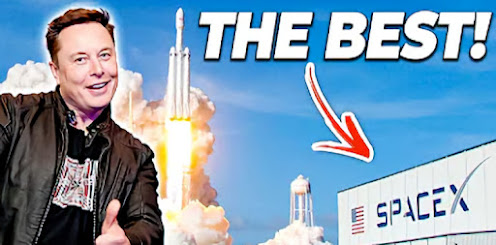Elon Musk has been in the news a lot lately, which really isn’t news – or surprising. Whether it’s helping enable internet access to a besieged Ukrainian citizenry through his Starlink constellation system, or less altruistic activities like his hostile takeover attempt of Twitter, the richest man in the world injects his sphere of influence into many realms.
Perhaps Musk’s most high-profile endeavor, of course, is
SpaceX. Currently – and successfully – cementing the idea of commercial space
business activities in Earth orbit, SpaceX is also looking long-long-range at
the colonization of Mars and eventual human exploration far beyond our Solar
System neighbor. And from the beginning, SpaceX has proudly reflected its own
spaceflight culture. Witness the decidedly different attitude on display during
SpaceX launches, with lots of cheering and waving in a party-like atmosphere,
compared to the staid liftoff proceedings witnessed within Kennedy Space
Center’s Launch Control Center throughout the Apollo and Shuttle eras.
Aside from such surface reflections, I’ve always been of a
mind that when one space effort succeeds, they all succeed – if for no other
reason than the illumination of success shines across the realm of space ventures
as a whole. But it’s increasingly difficult to ignore a somewhat manic subset
of SpaceX followers who eschew such a “one for all, all for one” philosophy.
This attitude was fully on display during NASA’s recent
attempt to stage a full-dress rehearsal of its Space Launch System on Pad 39-B at Kennedy Space Center, complete with full system fueling. As might be
expected with an entirely new assembly, numerous issues arose, to the extent
that a roll-back to the Vehicle Assembly Building for problem resolution will
delay launch plans until much later in the year. Each complication was derided
by dozens of Twitter-based proponents of Musk’s Starship program – a program
nowhere near as close to flight as NASA’s SLS. No matter – to them it’s
Starship or nothing.
This fascination has led to seemingly-full-time social media
“reporters” who plant themselves outside the SpaceX Starbase in Texas while trying
to monetize hours-long web streams that usually show nothing more exciting than
a pickup truck entering or exiting the Musk kingdom.
That’s just one symptom. I’ve seen SpaceX followers openly
mocking the development efforts of other aerospace entities, with some even
outright rooting for mission failures of rockets not bearing the correct logo.
There’s nothing like holding aerospace programs to the standards of juvenile
popularity contests.
Much of this frenzy is a strangely cult-like obsession with Elon Musk himself – which Musk certainly cultivates, consciously or not. It’s the aerospace edition of celebrity status circa 2022: how well known are you? In the increasingly weird global culture circling endlessly around influencers and personalities, being a celebrity is the very best thing you can do.
As a writer focused on the realm of aerospace, I will always
be interested in Elon Musk and how he directs SpaceX. The interest in Elon as a
person? Not so much. Like Apple’s own technical revolutionary, Steve Jobs, Musk
may be brilliant - but I don’t think I’d want to spend much time around him.



